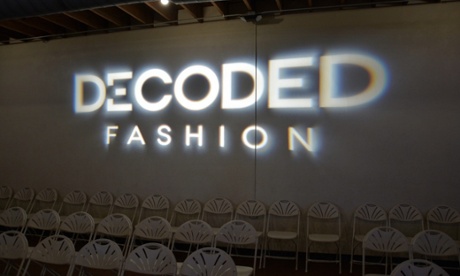
It is less than three years since Liz Bacelar launched Decoded Fashion, bringing together her considerable address book of fashion contacts and tech founders to bridge two very different industries.
Freshly acquired by the research and consultancy firm Stylus Media Group on 31 March for an undisclosed sum, Decoded fashion technology events have grown rapidly, reflecting a new commercial appetite for the sector.
Bacelar will continue to head Decoded, which is planning to expand its brand of conference and fashion-technology hacks across the US, Europe, Asia and South America.
Her own brand of enthusiasm comes from trying to "bridge the gap" between the two industries, she says, recently inspiring keynote speeches from big name designers including Zac Posen and Tumblr founder David Karp.
Tech has been 'disconnected about the opportunities of fashion'
Given how established many technologies are - the ubiquity of Google, Apple and the 1.2 billion-strong community of Facebook, let alone the plethora of inventive retail and fashion apps - it could be seen as surprising that the fashion industry has taken to long to wake up to the commercial opportunities coming from inventive new tech startups.
“The technology side has been really disconnected about the real opportunities in fashion and lots of tech founders have tried to create solutions or ideas that weren’t based on real knowledge of the industry,” she told the Guardian.
“On the industry side there was disconnect about the possibilities and a lack of awareness on what was rising.” She saw an opportunity to mix both worlds with a well-designed event that would appeal to the fashion crowd, but would also retain "the wit of real tech, and right from the source".
A former CBS News producer, Emmy nominated Bacelar launched her first Decoded Fashion event at New York's Lincoln Centre with 700 delegates, and now organises 20 events across the globe each year. In February 2012, Decoded hosted the fashion world's first large-scale hackathon, with the Council of Fashion Designers of America, inviting 650 technologists to New York to meet design and digital product challenges from a panel of fashion experts. The five finalists went on to present at Mercedes Benz Fashion Week.
“It was so incredible to see what happened that day,” says Bacelar, who was eight months pregnant at the time. “It was the first time that Women’s Wear Daily printed the word hackathon in a hundred years.”
In November 2012, a Decoded competition for startups offered $65,000 from Index Ventures and Marks and Spencer for the best idea. “They needed to captivate the people they were talking to with very plain terms and very clear vision on how they’d fit that into fashion. So that was the challenge. It doesn’t matter if it's a Silicon Valley titan - when it comes to conveying the idea to someone in the industry there has been a huge communication problem.”
'No excuses' for failing to represent women
Bacelar has also become something of a focus for push for more women in the technology sector. Decoded was not started as a women’s initiative, Bacelar says, but has found it fast becoming a platform for women interested in the tech industry to be noticed. "The amount of pitches I’m getting that are led by women is growing like crazy. What I can't stand is when you go to all the top tech events around the world and you see 5% females - the most I've seen was 8%,” she says, with some exasperation.
"There are no excuses any more," said Bacelar. "When you look at the lineup for Milan, New York - I was looking for the best voices, if I turn out 50% women it’s because that’s what I found due to proper reporting. If you’re just copying what speakers people had from previous events, you just perpetuating the problem of the lack of visibility of women in tech.”
Fashion courses churn out 'old thinking'
Entrenched prejudices about technology are still holding back designers, says Bacelar. It's no longer enough to follow old-fashioned practices to run a modern business.
“Every fashion university in the world, they’re churning out designers with the old thinking. Very, very few if any are really equipped with the eco-system of today," she says.
“A designer launching today needs to launch like a startup: What’s your mobile strategy? What’s your e-commerce strategy? How about communities?
"It’s not the old game of being picked up by a magazine,” she stresses. “Technology is intertwined - and the builders and creators are tastemakers, in the sense that they’re building the journey and the industry."
• Farfetch's José Neves on where digital meets fashion - video

